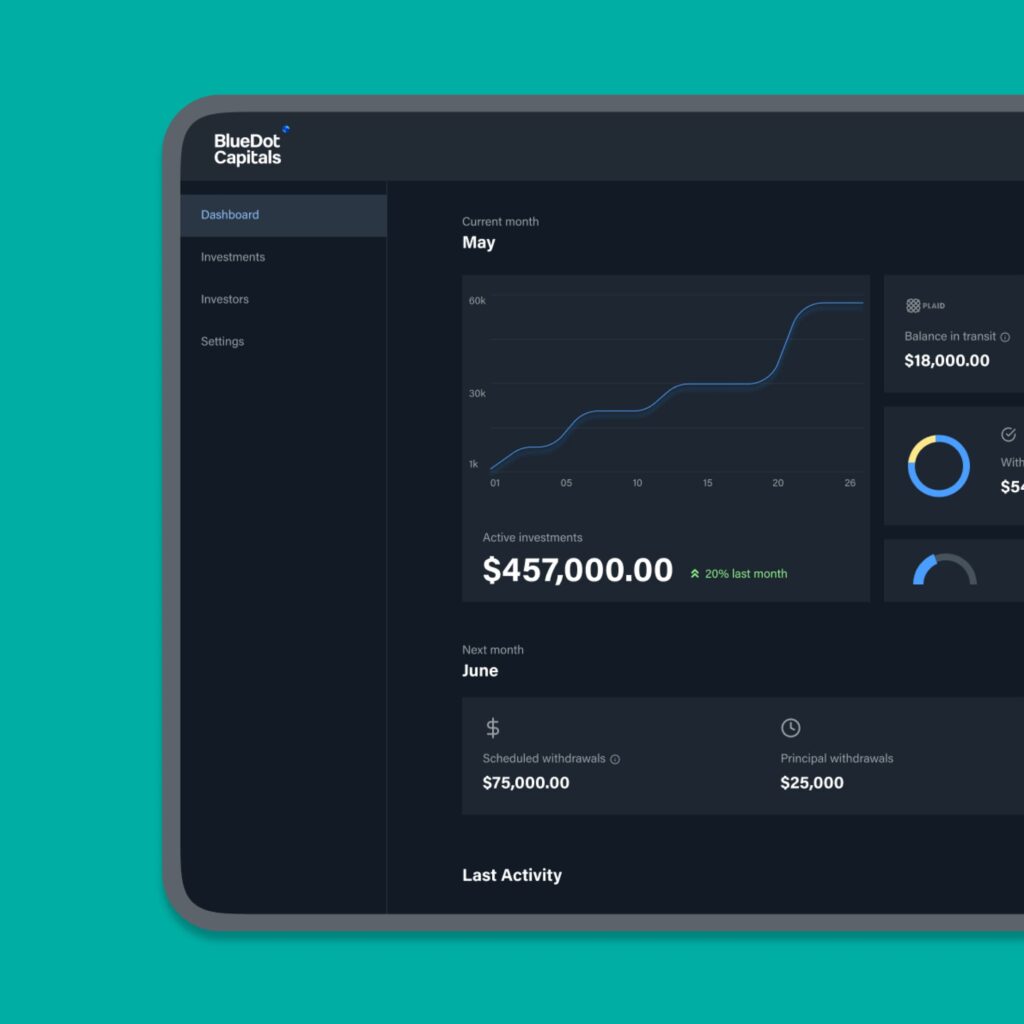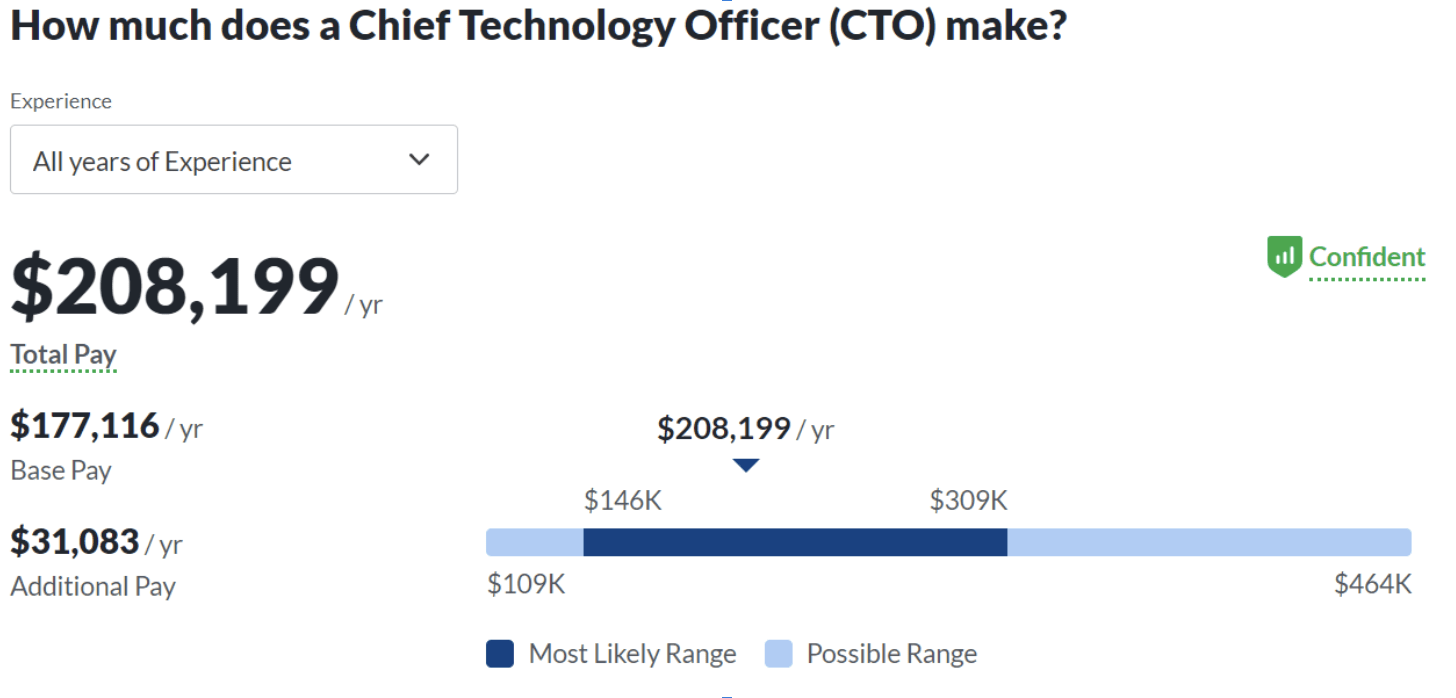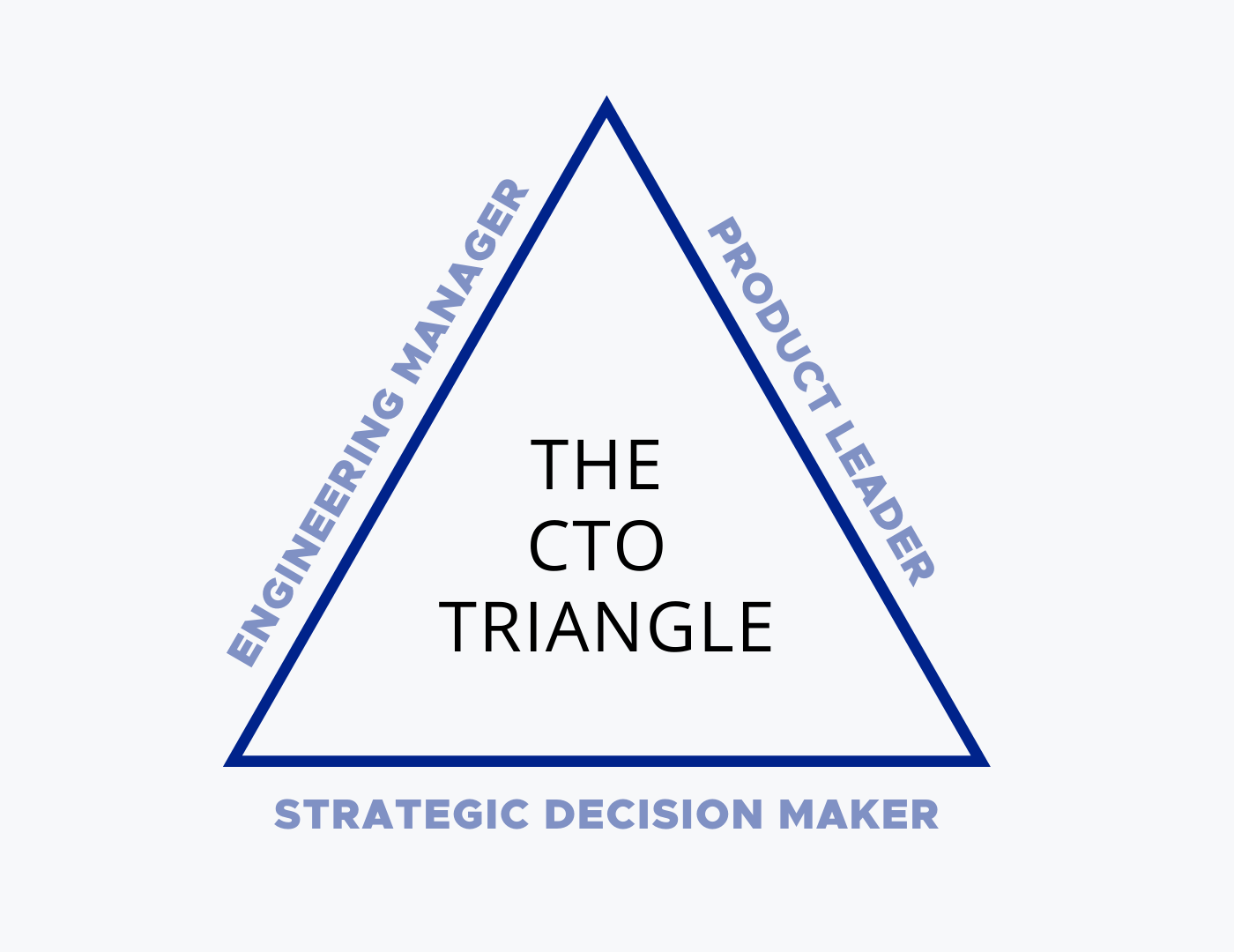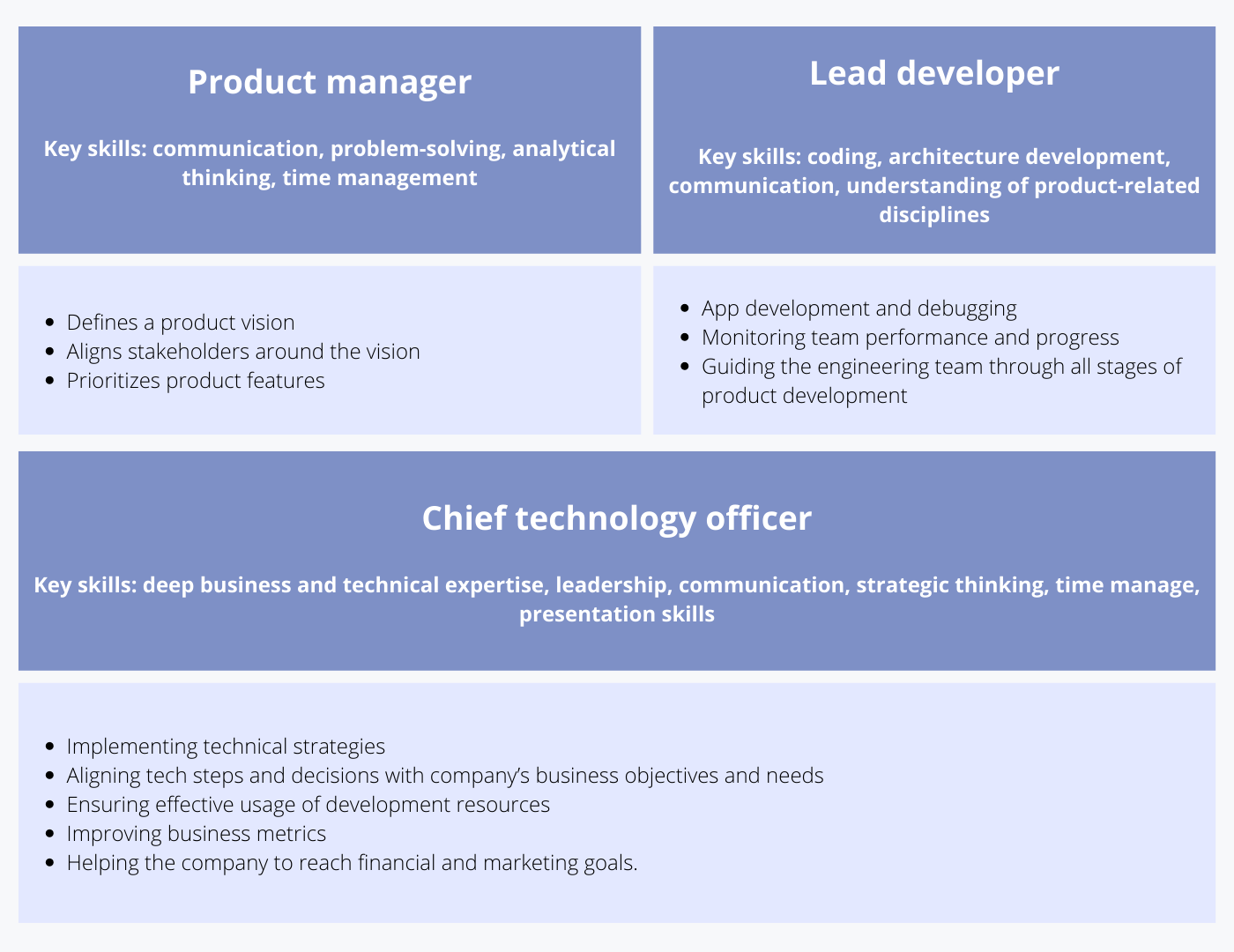Blog
How to Hire a CTO? Non-Tech Founders’ Go-to Guide to Starting a Cooperation with a CTO

A Chief Technology Officer is one of the most crucial roles every software business needs to fill. In today’s article, we’ll be taking a look at what role a CTO plays in a company, how to hire one, and everything you need to know when working and cooperating with one as a non-technical founder.
There are multiple decisions you as a non-technical startup founder need to make at the initial stages of your startup growth.
Market research, idea validation, prototyping, pivoting, idea pitching, and MVP launch may take an immense amount of time, effort, and energy. You may need to focus on a dozen things simultaneously and handle a bunch of tasks and challenges you haven’t ever faced before.
In the hustle and bustle of the early stage startup growth, there is a question that may bother you more than any other.
Should I start cooperating with a CTO?
A chief technology officer, or a CTO, is a particular role in the startup team.
This person is responsible for critical technical decisions including the technology stack for your product, its architecture, third-party integrations, effective communication with an engineering team, alignment between the business and development sides of your team, and many other significant tasks.
As you reach out to investors trying to raise funds for your company, they may ask you about risks and vulnerabilities you’re able to predict. Also, they may be curious if you have a CTO on board.
And a bothering question may run through your mind.
At this stage of your startup growth, do you need to hire one in your team?
You may have scrolled through a bunch of pieces of content devoted to this topic. However, hardly any of them answer your question.
This guide is aimed at shedding light on top CTO-related questions and explaining whether a CTO is a must for every software startup.
Do you need to work with a CTO?
Here comes a quick answer:
No, you don’t necessarily need to start cooperation with a CTO right away.
Unless you’re building a top-priority software solution for SpaceX.
What are some other cases of hiring a CTO?
- If you’re involved in rocket science, complex AI solution development, machine learning stuff, or other highly technical, advanced digital projects, you should look for a C-level tech expert.
- If your budget is unlimited, and you’re not interested in MVP development, with a strong focus on a full-scale product launch, you may want to start cooperating with a CTO as soon as possible.
However, if your case and these options don’t match, there’s no need to hire a technology officer at the start.
Why and when should you go back to this question? Let’s find out.
Scale your development and software with confidence!
Master strategy, roadmap, and code execution and start to ship more on each sprint.
The perfect time to hire a CTO: does it exist?
The number of C-level specialists or the time you decide to hire a CTO can’t impact your product’s success or failure. Check the main reasons why startups fail. None of them reported failure because there wasn’t a CTO in a startup team.
The top reason startups fail is running out of cash, and here’s what you should know.
According to Glassdoor, CTO’s salary may jump as high as $464,000 per year, with an average salary of $177,000.
Hiring a CTO may be extremely expensive, especially for bootstrapped and pre-seed startups. If you start with $50,000 borrowed from friends and family, it’s quite a desperate step to invest at least three times as much in one person’s salary, isn’t it? Thus, before hiring a C-level tech guy, make sure you have enough resources for this.
CTO, as well as a number of co-founders and C-level specialists in a startup, are not reported as one of the main causes of products’ failures. Instead, wrong decisions made at a wrong time can seriously affect your business.
There are more affordable ways to hire a CTO, and you’ll find out about them a bit later.
Now, let’s define three main factors that may define a time to hire a CTO:
- You have a validated idea
You have built an initial prototype or validated an idea in any other way, for example, using a concierge MVP, a forum MVP, or a no-code platform.
- You have a small development team
If you already work with a couple of tech specialists who are not able to advise you on specific tech things, the latest trends, architecture approaches, or other complex engineering topics, you may need help from a skilled IT professional. In this case – from a CTO.
- You need to take critical steps in your product development
Here, we mean the full digital transformation of your business, migration to an advanced tech stack, implementation of cutting-edge technologies, expansion to foreign markets, etc.
If you need help with significant tech decisions that may impact your entire business, product, and future, you may need to start looking for a CTO right away.
At the starting point, instead of focusing on the CTO role, it’s better to focus on gaining traction.
How can your startup benefit from a CTO as a part of your team?
What responsibilities a CTO may take over?
We can divide the long list of jobs to be done by a CTO into three main categories:
- Engineering management
As we’ve mentioned above, before you hire a CTO, you may need to have an engineering team. Probably, this team has built an MVP for you, or this team consists of your former schoolmates; you may have hired them yourself or an external recruiting agency has brought your teammates to your project. The point is that you have already worked with these people for some time, and plan to continue this cooperation. In this case, you can bring a CTO on board to improve the development processes and quality of delivered functionality, implement best practices and increase the team’s performance.
As your team grows, a CTO will also take over hiring and interviewing tasks.
As startups grow, the demands on each position also tend to grow. For instance, the CTO whose job at first was to perform initial system design and development eventually becomes responsible for hiring and leading a technical team, which requires very different abilities.
Source: The Founder’s Dillemas by Noam Wassermann
- Product leadership
A CTO can help you make strategic business and technical decisions to attract more funds, attention, and users to your product.
CTOs implement tried and tested research and analysis practices to identify ways to add more value to your product. They have a clear vision of the tech landscape and years of experience in the IT industry, and they apply their knowledge in recognizing common patterns, helping to avoid frequent startup mistakes, and contributing to your success.
The CTO will serve as the company spokesperson for the engineering organization, demonstrating leadership in the community with developers, partners, and customers.
Source: Inspired by Marty Cagan
- Strategic decision-making
How many times have you googled the best ways to build a certain product?
Have you ever faced the challenge of interviewing a tech specialist?
Did you try to keep a hand on the pulse of a dynamic and vibrant IT world?
Was it difficult for you to decide on a tech stack for your product? Or are you still deciding on it?
No matter what question has triggered your interest, you should know that an expert CTO should be able to answer all of them, as well as a myriad of other startup development-related questions.
A CTO will help you with making tech decisions you can’t or aren’t ready to make by yourself.
This specialist will save your time on research and analysis, thus, you may get a chance to invest it in business growth.
If only done at the right time, bringing a CTO on your board may bring you and your business lots of benefits.
Alternative ways to bring a CTO to your team
Hiring a CTO is an expensive but significant step for every growing startup.
Are there any ways to optimize the cost of the CTO’s services? Yes, we are ready to share three of them with you.
A blend of CEO and CTO responsibilities
- Prerequisites: you have an engineering background.
You’ve already come up with a great idea; you’re on your way to making it extremely profitable.
Seems like playing both the CEO and the CTO role in your company won’t be that hard.
It will be hard.
You may need to invest all of your time and attention into your product, trading your sleep time for startup time.
Besides, a one-man band has a critical disadvantage: a man simply can’t know and do everything.
When you try to deal with CTO tasks by yourself, you use only personal knowledge and experience in problem-solving. When you bring a skilled CTO on board, your startup may benefit with twice as much expertise.
Outsourcing CTO responsibilities
- Prerequisites: you are ready to work with an external CTO
Outsourcing is a way to delegate an amount of work to external specialists. What does the process look like?
- You look for a suitable company on Linkedin or Clutch
- Contact them and describe your requirements
- They consult you on significant questions and explain how they can help
- You agree on the cost, sign a contract, and start working together.
Hiring an outsourcing company may be a much faster and easier way to meet a CTO than trying to recruit a specialist in-house.
Also, this option can bring you a unique advantage: together with a CTO, you can hire several more software engineers, strengthen your company, speed up feature delivery, and enhance product quality.
CTO-as-a-service
- Prerequisites: you don’t need long-term full-time CTO services; you want to minimize investments.
This is a service provided by multiple agencies in the US and all over the world.
Opting for CTO-as-a-service, you pay for part-time tech and business advisory services, which is much more affordable than hiring an in-house specialist (to deal with tasks that may not even take 40 hours per week.)
CTO-as-a-service is the way to deal with key tech tasks like architecture design, code refactoring, process improvement, meeting with investors, etc.
Another way to go is a fractional CTO – A Fractional CTO, also known as a Part-Time CTO, is a professional who undertakes the role of a Chief Technology Officer on a part-time or contract basis.
They provide strategic technological leadership, guide the tech team, and participate in high-level decision-making, just like a full-time CTO would.
Can you replace the role of a CTO?
The core challenge for CTOs today is maintaining a focus on technology transformation while also addressing a suite of other challenges.
Source: Bloomberg
What is your suite of other challenges?
What would you like to delegate to a CTO?
Analyze your goals and priorities before you start looking for a perfect C-level tech partner.
A CTO may deal with the responsibilities of a product manager and a lead developer. What if you need one of them instead of a CTO?
A wrong CTO choice may cost you a fortune, nerve cells, or even your entire business. Do you have concerns about hiring a C-level tech expert? Would you like to get a piece of advice on that?
We offer Fractional CTO/CPO services! Get in touch with us today!
Read more


Case study:
Blue Dot Capitals
Learn how Blue Dot Capitals Successfully Built an MVP for an Investment App.

AI-Powered SaaS: Everything You Need to Know

7 Key Questions to Ask a Software Development Company

Unraveling the Complexity of API Integrations

Agile vs. Waterfall Methodology: Which is better for your SaaS?
Create a free plan for growth
Speak to Victor and walk out with a free assessment of your current development setup, and a roadmap to build an efficient, scalable development team and product.
“Victor has been great. Very responsive and understanding and really knows his stuff. He can go the extra mile by tapping into his prior experiences to help your company out. Really enjoyed working with him.”
Founder of Agency360

Victor Purolnik
Trustshoring Founder
Author, speaker, and podcast host with 10 years of experience building and managing remote product teams. Graduated in computer science and engineering management. Has helped over 300 startups and scaleups launch, raise, scale, and exit.


